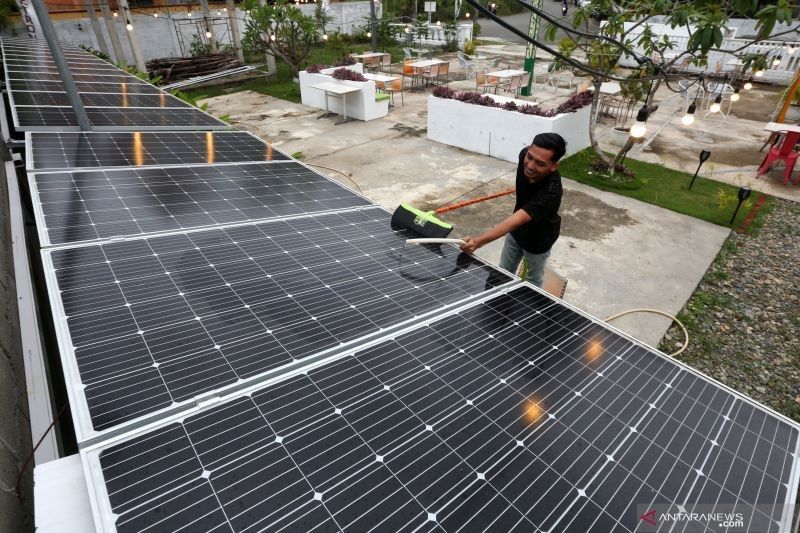
Illustration—A worker cleans solar panels at a cafe in Banda Aceh, Aceh, on November 29, 2021. The Ministry of Energy and Mineral Resources (ESDM) has pegged Indonesia's solar energy potential at 3,294.36 GWp. (ANTARA PHOTO/IRWANSYAH PUTRA/KT).
The energy system is undergoing a rapid transition through the latest (developments in) science and technology as well as the global demand for affordable, clean, and renewable energyThe Indonesian G20 Presidency is a good opportunity to be optimistic for solutions to climate change problems and strengthen energy resilience both nationally and globally, according to the University of Indonesia's Professor Mohammed Ali Berawi.
"The energy system is undergoing a rapid transition through the latest (developments in) science and technology as well as the global demand for affordable, clean, and renewable energy," Berawi remarked as the Co-Chair of Science 20 (S20) here on Thursday.
Berawi highlighted that the utilization of renewable energy sources and the digitization of energy systems is the key to easing the process of energy transition.
According to the professor, partnerships to realize equitable energy transitions require policies and incentives that are based on the needs and potential of each country.
Related news: Indonesia to hold three 2022 G20 TIIWG meetings around March-end
Berawi explained that strengthening synergy among governments, academics, and industries to create an optimal energy transition ecosystem will offer a momentum for revival and independence of the national energy industry.
"This action will create an ecosystem that produces accurate and adaptable policies, accompanied by strategic steps and work programs to realize an advanced Indonesia," Berawi affirmed.
In addition, Berawi pointed out that energy security or resilience is a crucial factor in a country's sustainability.
To this end, the government needs to improve the investment climate to increase competitiveness of investment in the energy sector through various conveniences and incentives, he explained.
Related news: Jakarta targets electrifying 50 pct of TransJakarta's fleet by 2025
He also reaffirmed that the government's policies should be inclined to offer incentives for the use of clean energy and be heedful of carbon emissions output.
"The government should prepare policies that accommodate the economic value of carbon whose implementation will be carried out gradually, including the imposition of the carbon tax," Berawi noted.
The professor also stated that energy transition became one of the main issues presented by President Joko Widodo at the launch of the Indonesian G20 Presidency in December 2021.
Through the forum, Indonesia and other G20 countries can take concrete action and make major breakthroughs, so that the results can be felt by the global community.
Related news: BKPM, Kadin team up to organize G20 side events
Related news: Bringing digital transformation to G20 as fast track to recovery


















